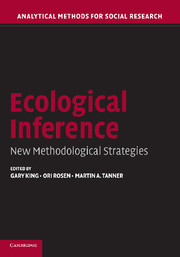3 - Using Ecological Inference for Contextual Research
When Aggregation Bias Is the Solution as Well as the Problem
Published online by Cambridge University Press: 18 May 2010
Summary
ABSTRACT
Gary King's ecological inference method represents a major breakthrough for analysts working with aggregate data because it is sensitive to contextual behavior patterns that previous methods had to assume away. King's critics underestimate the value of his method because they apply it to patently uninformative data, do not look for the contextual patterns that would improve estimation, and do not take advantage of the contextual knowledge that substantive experts would bring to an analysis. This chapter offers new diagnostic trials for the estimates from King's EI software, applied to data that have emerged from a genuine research agenda but for which the true values are known. Not only does the method do a superb job with typical precinct-level voting data, it even manages to produce solid estimates with inedequate county-level data once the analyst takes into account insights provided by the relevant scholarly literature. King's approach can and should be improved, but the imperfections provide no justification for using older methods of aggregate-data analysis or for relying solely on survey data such as exit polls.
INTRODUCTION
Debate over Gary King's proposed solution to the ecological inference problem (King, 1997) has begun to emerge in journals oriented toward statistics and political methodology.
- Type
- Chapter
- Information
- Ecological InferenceNew Methodological Strategies, pp. 69 - 96Publisher: Cambridge University PressPrint publication year: 2004
- 15
- Cited by

